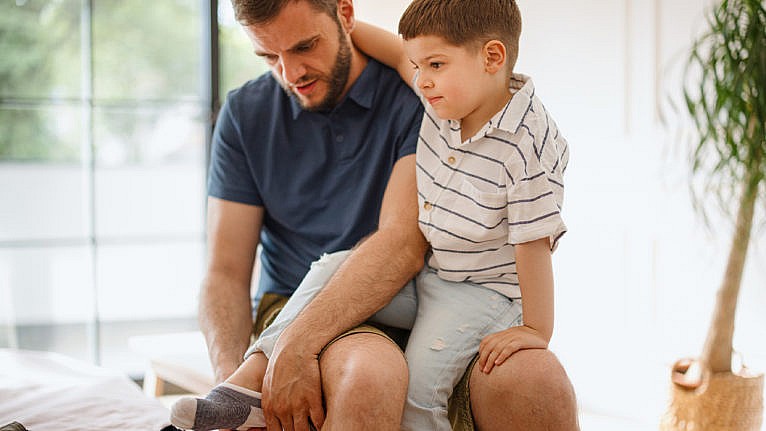Does your kid get overwhelmed by sights and sounds? Do seemingly small things, like sock seams or clothing tags, really bug them? You might have a highly sensitive child.

Photo: iStock/Anchiy
When you hear the phrase “highly sensitive” used to refer to a child, you might imagine a kid who cries at the slightest provocation. But parents of highly sensitive kids know that there is more to their children’s temperaments than big feelings. Highly sensitive kids have nervous systems that are highly aware and quick to react—and it is a temperament found in about 20 percent of children, according to psychologist Elaine Aron, the author of The Highly Sensitive Child.
Highly sensitive kids don’t necessarily have sensory processing disorder (SPD), however. The scientific term for it is sensory processing sensitivity, and it differs from SPD in that this low tolerance for distress is a personality trait or quirk, and not an actual dysfunction of the senses.
Here are nine signs your kid may be highly sensitive:
1. They have empathy to spare.
Highly sensitive kids are not only emotionally reactive, but extremely empathetic. Seeing the people they love get upset can often trigger them to get upset, too.
2. Clothes are a literal pain.
It’s not about preferring the Batman shirt to the Frozen tee—seams in socks and itchy tags can be impossible for a highly sensitive kid to handle due to their sensory processing sensitivity. Some parents, for example, may even special-order seamless socks online to cut down on daily getting-dressed battles.
3. They process things deeply.
This can be seen in a kid’s probing, thoughtful questions, their precocious use of big words after only hearing them a few times, or a difficulty making decisions “because [they] are thinking of so many possibilities,” Aron writes.
4. Common discipline methods don’t work for them.
An isolating time out or a stern raised voice doesn’t work. Because of their super-powered perception and processing, highly sensitive kids need a gentler approach. “The highly sensitive child will internalize everything you say and amplify it,” says psychologist Jadzia Jagiellowicz, a temperament consultant at the Highly Sensitive Society. “You say something, and they hear it 10 times louder and as 10 times more of a threat.” Speaking calmly and matter of factly when disciplining—and ignoring minor infractions—will go a long way.
5. Sleep after an epic day is no easy feat.
Sleep provides important downtime for sensitive kids, though due to their active minds and heightened awareness, getting them to sleep soundly—and consistently—can be a constant challenge. Drifting off quickly after an exciting day often feels impossible. A series of quiet, calming activities is a good way to reduce the intensity of stimuli and help a highly sensitive kid to wind down, Jagiellowicz says.
6. New activities are best with a gradual introduction.
Highly sensitive kids can be hesitant with new people or experiences, and do best with big changes if they’re introduced gradually, Jagiellowicz says. Visiting the new classroom, teacher or coach before they start the new activity, if possible, prepares them by introducing them to what’s to come, and the preparation has the added bonus of keeping you calm, too.
7. Their senses seem super-powered.
They can hear airplanes before anyone else, and smell the slightest odour that is nearly imperceptible to others. They are also quick to notice subtle changes in the appearance of people or places, like a piece of furniture that’s been moved. And though loud sounds can overwhelm anyone no matter their temperament, it can take a lot less than the loud wail of a siren to make a highly sensitive kid cover their ears. Common kid examples are public washroom hand dryers or the sound of a flushing toilet, but a highly sensitive kid might even dread the sound of a cardboard cereal box being opened, or react to someone’s squeaky bike passing by on the sidewalk.
8. Wet or sandy clothes are a no-go.
A spare outfit is a must-pack item for your family. Wet and sandy clothes don’t last long on the bodies of kids with heightened awareness of subtle stimuli. Even the feeling of sand between their toes can be too much to handle.
9. Parenting them is a challenge, but also a gift.
Parenting a highly sensitive kid can be a challenge—particularly for parents who aren’t highly sensitive themselves, or who wish their kid could be more flexible or adaptable. Jagiellowicz stresses that it’s important to be tolerant of your child’s sensitivities. Try not to take their reactions and behaviour personally, and focus on helping them through intense moments by reducing the amount of stimulation. By providing a stable, safe base for them to explore the world at their own speed—giving them “roots and wings,” as Jagiellowicz calls it—you can set them up for future success. And, as Aron writes, “What could we need more right now than people who think carefully, feel deeply, notice the subtle details, and end up having the big picture?”
FILED UNDER: Parenting Parenting styles Preschool behaviour Preschool development sensory sensory processing disorder service seo
Source link : https://www.todaysparent.com/kids/kids-health/signs-you-have-a-highly-sensitive-child












